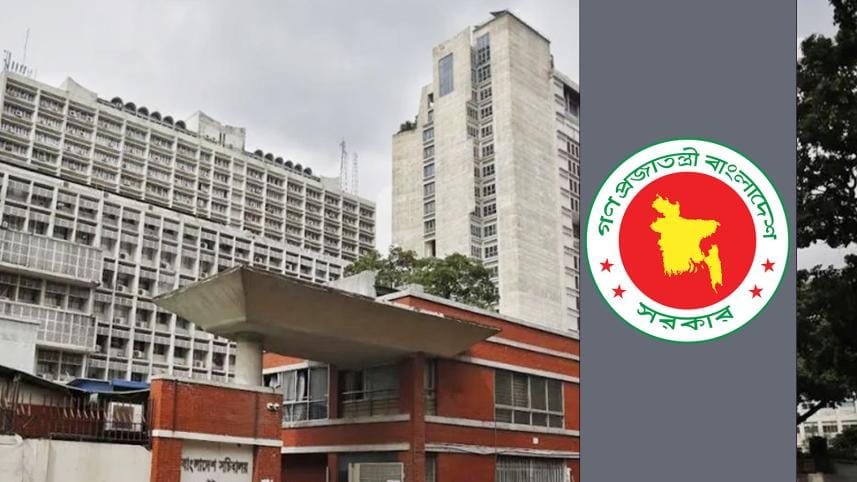Bureaucracy falters without clear direction

More than seven months have passed since the interim government took charge, yet the civil service is steeped in a sense of inertia.
While expectations were high for dynamic governance under this government, the bureaucracy is badly in need of vital changes that remain stalled.
Career civil servants say that a gap has grown between them and Chief Adviser Prof Muhammad Yunus over the months, leaving the administration adrift.
"The kind of leadership required in the post-uprising period is missing among many top officials. Young officers are left without proper guidance, and in such a situation, it is natural that they will not take the initiative for reforms."
They say that retirees who are leading crucial ministries on contract have little accountability or motivation for change, as they do not have incentives such as promotions. Also, they have long been out of service. As a result, critical reforms that require only administrative directives are in limbo.
Top civil servants, however, either declined to comment on the matter or denied allegations of a gap.
Sheikh Abdur Rashid, the first cabinet secretary of Bangladesh to be appointed to the same position on a contract basis more than 10 years after retiring, dismissed the allegations of a gap between the administration and the chief adviser.
"This is not true; this is not a fact. There is no such thing as isolation. Everyone maintains professional relationships with each other," he told The Daily Star last night.
This correspondent spoke to a dozen bureaucrats, ranging from deputy secretary to secretary in five ministries, who acknowledged that routine changes in the civil service are stuck.
They pointed out that there are no representatives from the civil administration in the chief adviser's personal wing.
As a result, regular bureaucrats feel isolated and without effective leadership from the chief adviser. Many of them have adopted a passive approach, merely counting down until the next elected government takes over.
Senior bureaucrats argue that certain internal reforms should have already been carried out, as they require only administrative orders rather than major policy overhauls.
For example, an additional secretary of the Cabinet Division said, the advisory council instructed the ministry to conduct a necessary review regarding quotas on January 30. But no proposal on the review has been presented to the cabinet in the past month and a half.
Frequent transfers have also made such reforms difficult to implement, according to officials. The head of the public administration ministry's reform and research wing was transferred a few months after his appointment.
At least four additional secretaries have been appointed to the regulation wing, responsible for regulatory reforms, since August 5, but they too were soon transferred.
Mokhles Ur Rahman, senior secretary to the public administration ministry, would not comment on the matter when approached on Wednesday.
A secretary, speaking on the condition of anonymity, pointed to the Rules of Business, a key document for running the government. He said while the other rules outline proper procedures for governance, rule 33 allows the prime minister to overturn any decision, creating scopes for authoritarian decision-making.
But neither the Cabinet Division nor the public administration ministry has taken any initiative to amend this provision.
Additionally, the secretary said, the Land Registration Office is currently under the law ministry, but if it were transferred to the land ministry, land-related services would become more efficient.
However, even though the interim government has been in office for nearly eight months, no ministry has taken any initiative in this regard.
Asked about internal reforms, Cabinet Secretary Rashid said, "Reform is a long-term process. Some changes have already been made, but it may take more time for you to notice them. Some initiatives are ongoing, which will take even longer to become visible."
An additional secretary said the chief adviser, at a meeting with top bureaucrats on September 3 last year, asked all the secretaries to present a brief outline of internal reforms for their respective ministries.
"Seven months have passed. Where are those reform proposals? Did the secretaries submit any proposals at all? If they did, what is the progress of their implementation? Is there any monitoring in place?"
In the daily operations of the government, the cabinet secretary, principal secretary, and the secretaries of key ministries such as public administration, home, finance, land, and education play crucial roles. These ministries, except for finance, are being led by officials who had retired long ago. There are allegations that these retired officials hold a "dismissive view" of the regular officers of the current administration.
Serving bureaucrats say their promotions remain stalled due to these contractual appointments. At the same time, the contractual officials constantly make disparaging comments about regular officials which are affecting the administration, senior bureaucrats say.
Former secretary AKM Abdul Awal Mazumder, a public administration expert, told The Daily Star that a lack of coordination in the administration is evident.
"The kind of leadership required in a post-uprising period is missing among many top officials. Young officers are left without proper directions, and so it's only natural they will not take the initiative for reforms."
Awal said there were opportunities in the post-August 5 period for administrative actions that did not require legal reforms. "However, ministries are not undertaking such initiatives," he added. "It is the responsibility of the Cabinet Division and the public administration ministry to ascertain why no steps are being taken for reforms."
Out of the 81 secretaries, 25 were appointed during the previous government while 56 by the current administration, including 17 on contract. However, this overhaul has not helped the civil administration become more efficient.
A secretary, speaking anonymously to The Daily Star, explained that secretaries do not execute fieldwork themselves; they ensure that the work gets done. "Many of the newly appointed secretaries have not held key positions for a long time. So it is natural that they lack the necessary network. The administration is like a machine that needs to be kept running. It cannot be suddenly activated."
When asked about ways to improve administrative efficiency, a joint secretary of the Cabinet Division said, "Since taking office, Chief Adviser Prof Muhammad Yunus has held only one secretary-level meeting on September 3. He visited the Secretariat only once, on November 20. Following the mass uprising, he should have visited each ministry in turn and conducted at least one secretary-level meeting every two months to infuse the administration with dynamism and energy.
"If he was unable to make time, he could have delegated the task to an adviser. At the very least, the cabinet secretary could have held monthly meetings with all the secretaries to oversee internal reforms and monitor regular activities. Unfortunately, none of that is happening."
Government insiders acknowledge the sense of stagnation within the bureaucracy. Lately, the chief adviser's press secretary, Shafiqul Alam conceded that the administration was unable to function at the desired pace. "There is now a perception that efficiency is secondary, while political favouritism is the priority. Unfortunately, this is the reality," he said in an interview with a private TV station on March 12.




 For all latest news, follow The Daily Star's Google News channel.
For all latest news, follow The Daily Star's Google News channel.
Comments